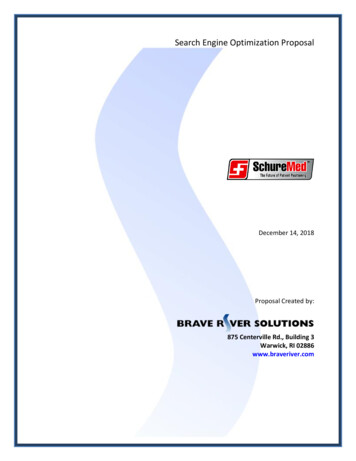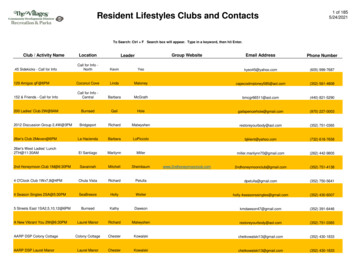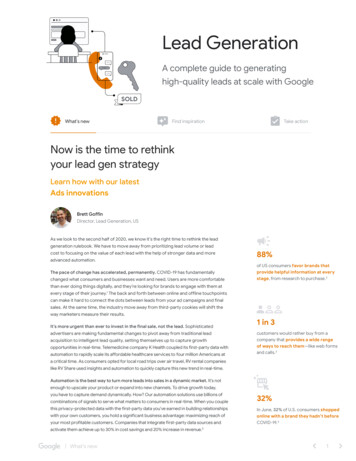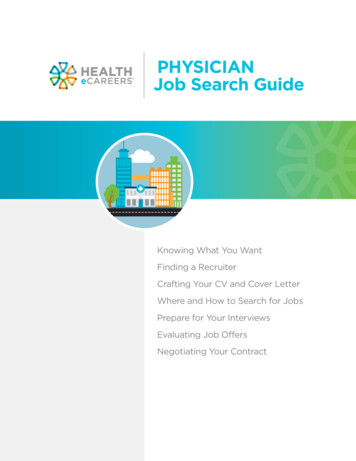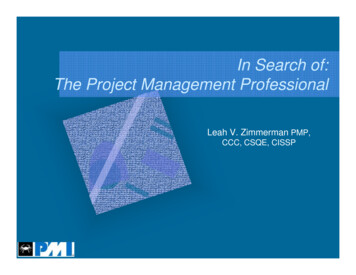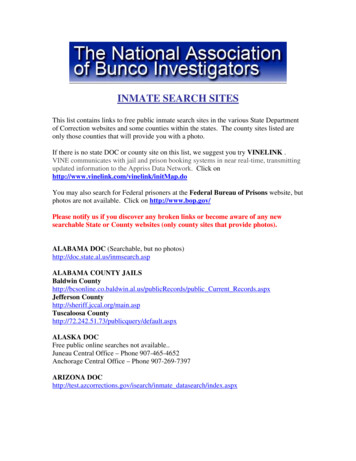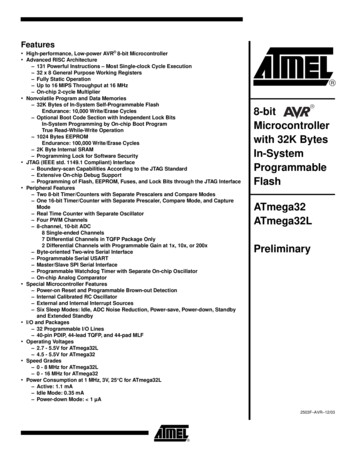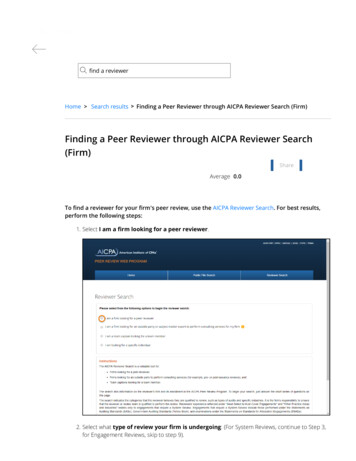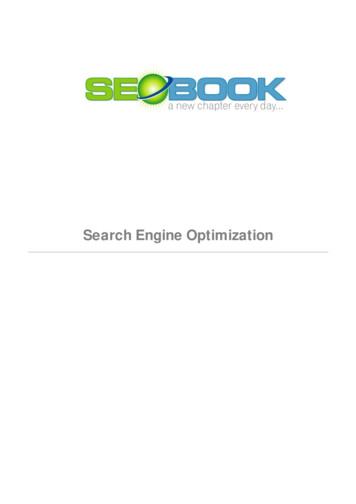
Transcription
Search Engine Optimization
A A R O N M A T T H E W WA L LSearch Engine Optimization Book Aaron Matthew Wall150 Caldecott Ln #8 Oakland Ca 94618(401) 207-1945 seobook@gmail.com
Table of ContentsSEO Tools8Picking a Product8Picking a Domain Name9Domain Registration & Hosting9Analytics10Keyword Selection10Page Optimization10Home Page Optimization11Site Optimization11Registering With Directories12Link Building13When Algorithm Changes Occur14Common SEO Abuse Techniques15Appearing Natural15Social Considerations16Closing Tips16SEO as a Standalone Product20The Social Elements of Relevancy22Starting from Broke23Questions, Comments & Concerns24Interactive Elements25Finding Prospects26Interactive Elements27Some Notes28The Goal of Search Engines & How They WorkOrigins of the Web37Commercialized Cat & Mouse38Choosing a Domain Name43Hosting52Interactive Elements54Some Notes55Learning Your Subject57Changing Your Site62Copywriting65Usability71Generating Revenue77293
Blogging87Interactive Elements91Some Notes95Analytics97Keywords98Meta Tags118Page Title Tag Done Wrong123Page Title Tag Done Right124Information Scent127Internal Linking127Navigation133Optimizing Your Page Copy137Building Content142Unexplored Waters147Interactive Elements147Some Notes151Search Engines versus Directories153Submitting Your Site153Social Interaction and Links154General Directories157Niche Directories162The Active Web168Interactive Elements168Some Notes170The Major Search Engines171Google171Yahoo! Search194Microsoft200Ask201Comparing Search Results206Interactive Elements207Some Notes210Text in Incoming Links211Exchanging Links220Requesting Links222Evaluating the Quality of a Link231Free Links & Buying Links232Waiting for Results246Customizing Your Browser for SEO248Interactive Elements249Some Notes252Problems with Manufacturing Relevancy 254Real versus Artificial2554
Things Google Can Track257My Tinfoil Hat Theories 259Is Your Site Future Ready?260Don’t Discount the Present Opportunity 261Blurring Editorial vs Ads & Editors vs Users266Market Edges268Resources270Some Notes271When Results Don’t Show272SEO Worst Practice Manual273Other Problems278Speeding Things Up: Paid Inclusion282Other Search Engines284Interactive Elements288Before You Start290What is Pay-Per-Click?292Yahoo! Search Marketing295Ad Writing Tips301Earning (and Buying) Trust307Google AdWords309Bonus Info: How to Improve CTR and Slash Google AdWords Costs to Maximize Profits:Microsoft adCenter328Other PPC Providers329Resources Cited329Some Notes333The Goal of this e-book335What are Your Goals?335SEO Business Models336More Information on Buying SEO Services339Resources340Online Auctions341Forums342Writing Articles342Ideal Clients343Where to find Clients343Questions to Ask Clients344Being Your Size345Contracting & Outsourcing346Cold Calling346Niche SEO: Real Estate346Sales Cycle347Contracts347Reports3485315
Dependency on Free Traffic348Affiliate Sites & Passive Income Streams 349Resources3496
Author’s NoteBefore getting too far into SEO, thinkabout whether the idea you have isone that will be easy to spread. If it isnot, think of how you can transformyour concept into something that iseasier to disseminate throughout theInternet.Chapter 3, General Internet Topics,covers many non-search relatedInternet topics. I include this becauseif you do well with many of the “nonsearch” related topics it becomes fareasier to build a linking campaign andachieve top search engine placement.It is usually far easier and far moreprofitable to create an idea worthspreading than it is to spread an ideanot worth spreading.For competitive phrases, linkpopularity and the words in thoselinks are the single most importantpart of Search EngineOptimization (SEO). But to get theright types of people to want to votefor you your site needs to do manythings well.Disclaimer: Since search engines areconstantly changing while still keepingsecret their algorithms, there is no wayto know the exact algorithms at anygiven time. However, due to datacollected through observations ofsearch engines over the past severalyears, it is my hope that this book willteach you how to make informedobservations and decisions as searchengines continue to change. Withenough experience, one can discernpatterns in the search engine puzzle,and as a result, figure out how theprocess works. This guide was createdto help you learn to identify thosepatterns and solve the puzzle.With most websites, conversion andprofit are more important than thesheer amount of traffic you get.Making small changes within your sitecan double or triple your conversionrate. If you do everything elsecorrectly, you do not need to put asmuch effort into SEO.If you already know the topics coveredin Chapter 3, feel free to skip overthem. More than trying to answer allquestions about the web, Chapter 3 isthere to help point you towardanswers to other Internet businessrelated questions you may have.While following this guide should helpimprove your rankings, I, the authorof this book, shall not be heldresponsible for damages because ofthe use (or misuse) of this information.7
Quick Summary of Do-ItYourself SEO TipsMany people who buy this book will never read it in its entirety. To help whet yourpalate and ensure you get some value out of this text (and, therefore, read thewhole thing), here is a quick-start checklist highlighting the most important aspectsof search engine optimization and Internet marketing. When looking to start withsearch engine optimization, consider the following issues:SEO ToolsOftentimes using the right tools can save you both time and money. I have createda free PDF checklist of all the SEO tools I use. You may download it here:http://www.seobook.com/seo-tools.pdfPicking a ProductYou may read this title and think that you have already accomplished this step,and that your product (or your vision for your product) is already refined,wrapped, and ready for purchase. However, there are many key questions thatshould be considered before bringing your wares or service to customers: Are you interested in the product you are trying to sell? If not, why not choosea different product?The Internet makes marketing anything a possibility. You are far morelikely to succeed if you are interested in what you are trying to sell. Also, it isfar easier to sell people what they want than to get them to want your product.Create something the market wants.Is the marketplace for your product oversaturated?Examples: Posters, credit cards, prescription drugs, hosting, generic sitedesign, and ink refills are all oversaturated markets. Breaking into thesemarkets can be exceptionally difficult, so think carefully about what wouldmake your product different and needed.Is the product something people would want to order over the web?Is there something you can do to make yourself different than everyone elseon the market? (Please note: “cheaper” usually is not a legitimatebranding/business model for most websites in a hyper-competitive market.)Example: No other e-book covering SEO was supported by a blog thatkeeps up with the SEO industry every day (at least, not when I first wrote thisone).Another example: In 2002, I created a SEO “worst practices” directory.To this day, nobody else has made a site like it. It earned me thousands in thefirst year with a marketing budget well under 100.8
In the end, ask yourself -- Would people want to link to your site without youasking them to? If not, what creative or original ideas can you add to your siteto make people want to link to it?Picking a Domain NameFinding the right domain name can be a tricky business, and indeed, can meanthe difference between success and failure in the online marketplace. As such,it is important to consider the following before choosing a domain name: FOR NEW SITES: Depending on your branding angle, pick a domain namethat is either highly brandable (meaning that it can be easily and positivelyassociated with your product or service) or one that has your primarykeywords in it. Use a short and memorable domain name. It is fine if it doesnot have your keywords in it if it is memorable. For serious, long-termwebsites, a memorable domain name will be one of the key ingredients tosuccess.If your domain name exactly matches your keywords Google places arelevancy bonus on your site. (ex: SeoBook.com ranks easily for both seobookand seo book).If you are going to be working in competitive fields, or if you will have largesites, you may want to use a different domain for each different language youare targeting.Examples of domain names I own: BlackHatSEO.com,SEOBook.com, FattyWeightLoss.com, and Threadwatch.orgDomain Registration & HostingOnce you have selected a domain name, you must make sure that it isavailable, and then register it. After your domain name has been registered,you must find a reliable host for your website. Register your domain with an ICANN (Internet Corporation for AssignedNames and Numbers) accredited registrar. I use GoDaddy.Register as a .com if possible, if you have a global market. If you cannot get a.com, but a great .net or .org is still available, it might be worth it to registerone of those instead of registering a longer (and less memorable) .com domain.If you are targeting a specific country or language, register a domain name inthat country’s top-level domain designation (e.g., buy a co.uk website for aU.K.-targeted site). Also buy the .com version of your domain name and pointit at your country-specific location.Oftentimes certain directories and search engines will either be biased towardlocal sites will or only let local sites in the index. “Local” may mean endingwith a local domain and/or being hosted on a server in that country.Host your site with a reliable host. I recommend DreamHost or Pair.com.For dynamic sites, make sure your host supports the technology you will beusing (such as ASP or PHP) before spending money.9
AnalyticsIt helps to install a free or cheap analytics program like Google Analytics orHaveAMint.com before you start marketing so you can see what keywords yourank for. It is easier to rank for related keywords than to rank for entirely newkeywords.You can also use pay per click marketing on Google, Yahoo, and Microsoft rightoff the start to learn what keywords convert well for you and which keywords donot.Keyword SelectionKeywords are what help your site get recognized by Internet search engines,and as a result, help would-be customers find your Internet presence. Thereare many strategies that can be employed to ensure the likelihood of yourwebsite coming up in keyword searches: Use a keyword tool to help you find the most targeted keywords for your site.The tool at http://tools.seobook.com/general/keyword/ is free and cross-referencesjust about every useful keyword research tool on the market.Pick themes or keyword baskets around which you can optimize the varioussections of your site.Targeting keyword phrases is a much better idea than trying to target individualwords. Keyword phrases tend to be easier to rank well for AND they typicallyconvert far better than individual words.Target different keyword phrases on each page.Target no more than one or two primary and two or three secondary keywordphrases per page.If you generate hundreds (or even thousands) of pages of content, make surethey read well and have unique content. Over time, if people cite your content,your page will start to rank for many different terms as long as it is unique andtargeted around a theme.Page OptimizationPage optimization is the process of making sure that your website functions inthe most effective way possible in relation to search engines. The followingare steps you can take to optimize your page: Use your keywords in your page title. Place the most important keywordphrase close to the beginning of the page title. Do not put your site title onevery page of your site unless you are really trying to brand that name. In thatscenario, it still is usually best to place the site name at the end of the pagetitles.Shorter site titles are usually better than really long ones.10
Sometimes I overlap related keyword phrases in the page title. Overlappingkeyword phrases in the page title can help you pick up multiple search phrases.For example, professional search engine marketing services helps me obtain goodrankings for (1) search engine marketing, (2) professional search engine marketing, (3)search engine marketing services, and (4) professional search engine marketing services.Meta tags are not extremely important, but they can help some. The metadescription should be a sentence to a paragraph describing the page contents.The meta description tag can be seen in some search results, so you want towrite it for human eyes and for it be compelling.The meta keywords tag is probably not worth the time to make, but if you domake one, it should contain your primary keyword and its commonmisspellings and synonyms. Each keyword phrase in the keywords tag shouldbe comma separated.Use a single, descriptive H1 header on your page containing the keywordphrases similar to those you targeted in the page title. This helps reinforce thepage title.Use descriptive subheaders (H2 or H3) before every paragraph or every fewparagraphs. This improves usability and helps define what the page is about tosearch engines without making the page look like it was written for a searchengine.Use bulleted lists and bolding to break up content and make it easier to read.Write your content for human consumption. If you write exclusively forsearch engines, the pages will read poorly and nobody will want to look atthem.Home Page OptimizationIn addition to page optimization for search engines, it is also important tooptimize your site's home page for customers in order to make sure itfunctions efficiently. Make sure your home page builds credibility and directs consumers to them
to help you learn to identify those patterns and solve the puzzle. While following this guide should help improve your rankings, I, the author of this book, shall not be held responsible for damages because of the use (or misuse) of this information. 8 Quick Summary of Do-It-Yourself SEO Tips Many people who buy this book will never read it in its entirety. To help whet your palate and ensure .
